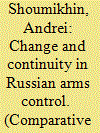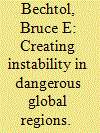| Srl | Item |
| 1 |
ID:
087990


|
|
|
|
|
| Publication |
2009.
|
| Summary/Abstract |
Throughout military history, some changes in technology have provided new weapons and capabilities to military commanders. Some of those changes were so significant, as in the case of nuclear weapons, that they modified the strategic positions of the countries that possessed them within the international system. Although biological weapons cannot destroy civilian or military infrastructure, they can kill people in large numbers. Because the effects of the dissemination of biological weapons are invisible, delayed, and uncertain, genetically modified biological weapons can acquire a deterrence capability that would present serious challenges to United States policymakers.
|
|
|
|
|
|
|
|
|
|
|
|
|
|
|
|
| 2 |
ID:
087988


|
|
|
|
|
| Publication |
2009.
|
| Summary/Abstract |
Russian arms control is not a brand new creation disembodied from the past but is heavily influenced by the history of arms control in the Soviet era. Tracing the evolution of Russian thinking from the days of Stalin, through the arms control boom of the 1970s, to the reforms of Gorbachev and the Soviet disintegration, this article flushes out the Soviet perspective on issues such as strategic stability and the use of treaties to slow an adversary's technological advancement. Further, this article relates the influence of Soviet opinion to current-day thinking in the Russian Federation (RF). As the U.S. and the RF prepare to tackle tough issues, like the expiration of the Strategic Arms Reduction Treaty in 2009, these viewpoints become particularly salient.
|
|
|
|
|
|
|
|
|
|
|
|
|
|
|
|
| 3 |
ID:
087986


|
|
|
|
|
| Publication |
2009.
|
| Summary/Abstract |
North Korea contributes to instability in the Middle East and South Asia through its proliferation of missiles and other weapons systems used as delivery platforms for chemical (and the production of chemical munitions) or biological weapons, including long-range artillery. Evidence also shows that North Korea has collaborated in the nuclear programs of Syria, Iran, Libya, and Pakistan and has provided weapons and training to terrorist groups in both the Middle East and South Asia (Hezbollah and the Tamil Tigers). Given the recent decision by Washington to take Pyongyang off of the list of State Sponsors of Terrorism, the recent and ongoing activity by North Korea directly related to proliferation of WMD and the support of terrorist groups could lead to severe foreign policy challenges for the United States and its allies in the future.
|
|
|
|
|
|
|
|
|
|
|
|
|
|
|
|
| 4 |
ID:
087989


|
|
|
|
|
| Publication |
2009.
|
| Summary/Abstract |
India and Pakistan have now been nuclear powers for at least a decade, apparently already having "gone to the brink" several times. Despite the dire potentialities of nuclear exchange, both countries pursue very specific nuclear deterrent and response strategies. These strategies can be found in their doctrinal development, how they articulate that doctrine and affiliated "red lines," and deployment of nuclear weapons delivery means and associated systems (such as antiballistic missiles systems and satellites).
|
|
|
|
|
|
|
|
|
|
|
|
|
|
|
|
| 5 |
ID:
087991


|
|
|
|
|
| Publication |
2009.
|
| Summary/Abstract |
It is widely claimed that the current British Maritime Doctrine is highly influenced by the ideas of British strategist and naval historian Sir Julian S. Corbett. These conclusions, however, rarely originate from systematic empirical investigations of the doctrine itself. The purpose of this article, therefore, is to investigate the intellectual bonds between Corbett and this particular doctrine. In order to bring structure and coherence to the investigation, distinctions are made between four different kinds of influence-formal and informal influence, as well as direct and indirect influence. Although Corbett's influence can certainly be established, it needs to be qualified in at least two respects: his ideas are much more influential in maritime/naval matters on the military-strategic level of war than on operational aspects, and his thinking often seems to be used to "intellectually" legitimize a proposition or a conclusion reached for other reasons. While focusing on certain aspects of Corbettian thinking and disregarding others, the authors of British Maritime Doctrine in fact often tend to quote not Corbett or his thinking, but rather his legend.
|
|
|
|
|
|
|
|
|
|
|
|
|
|
|
|
| 6 |
ID:
087987


|
|
|
|
|
| Publication |
2009.
|
| Summary/Abstract |
The proliferation of weapons of mass destruction is clearly one of the greatest security threats the Western world faces today. Counterproliferation has been one of the core objectives of the Bush administration from its first days in office. While there is bipartisan support in the United States for the concept that proliferation represents a serious threat, there is substantial disagreement on how to deal with this threat.
|
|
|
|
|
|
|
|
|
|
|
|
|
|
|
|